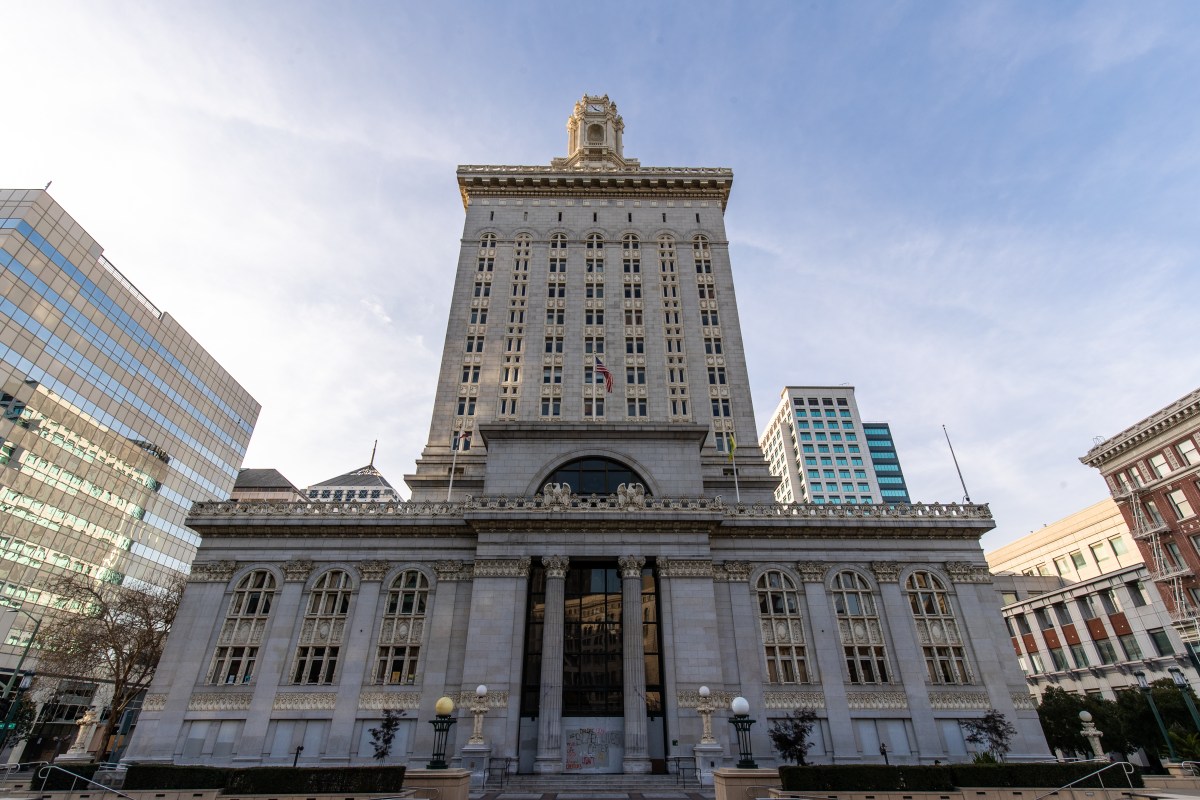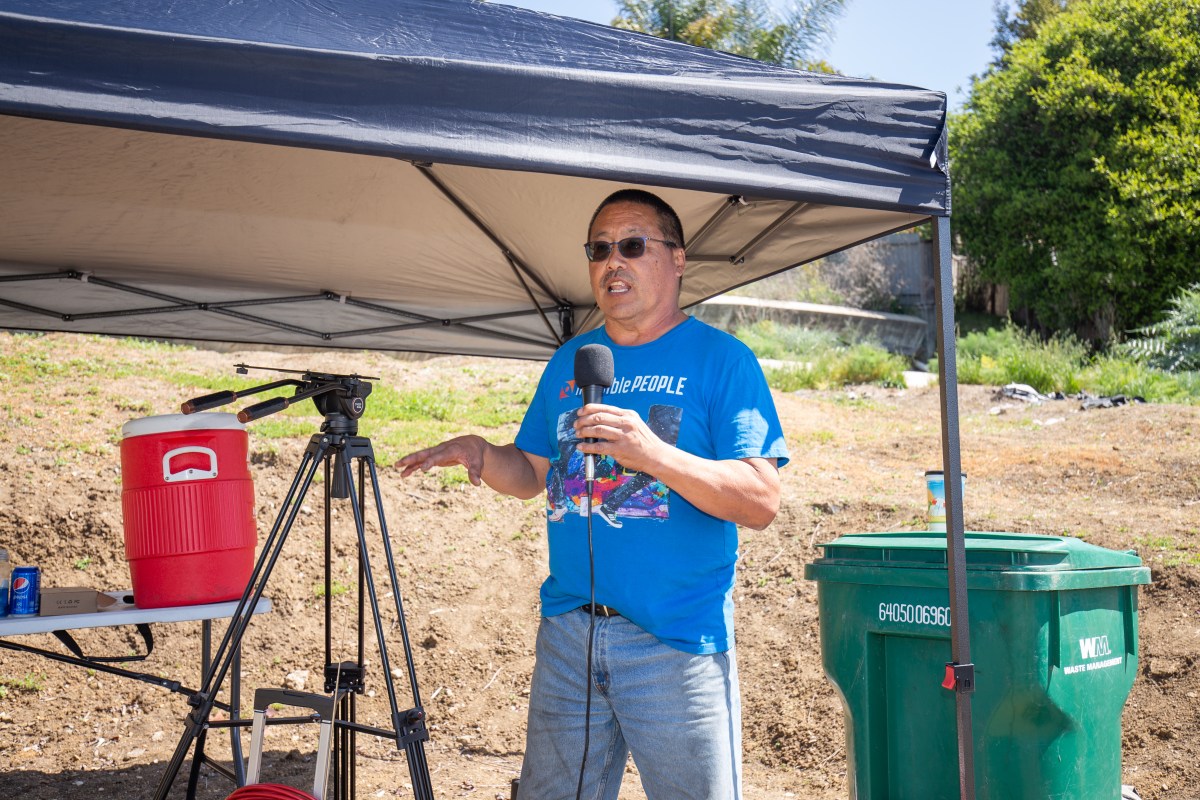
On Friday, Aug. 12, Allyssa Victory was at work, looking forward to her final weekend of campaigning before the deadline to file paperwork with the city that would make her run for mayor official, when she got a phone call that sent her into a panic.
The call was from the city clerk’s staff. They told Victory that she had three hours left that day to submit the papers to qualify for the ballot. If she didn’t, she wouldn’t be allowed to run.
“I was shocked,” said Victory. She told The Oaklandside that earlier in the summer, when she initially pulled papers to run for mayor, the clerk’s office communicated to her that the deadline was Aug. 17 to submit a list of signatures of registered voters nominating her, a photograph, an oath of office, and other required materials. She felt like the rules had been changed at the last minute, with the deadline moved up five days.
“The clerk’s office said they reinterpreted the rule, and you have to come today,” said Victory, a civil rights lawyer who works for the ACLU of Northern California. “I said, ‘That’s unreasonable, this is your own error,’” but they were insistent, she said. Victory got on the phone with her campaign manager, wrapped up tasks at work, and scrambled to make it to City Hall before evening.
It wouldn’t matter: Victory is one of at least two would-be candidates who say their names are being left off the ballot because the deadline was allegedly changed.
The deadline has now become the subject of controversy, with supporters of Victory and others crying foul and demanding answers from the city clerk and other city officials.
Deadlines based on whether incumbents can run for reelection

The controversy boils down to how the city clerk’s office interpreted and communicated state election law to the candidates. Under the law, most people who wanted to run for council, mayor, or other elected positions this year had to file all their paperwork with the clerk by Aug. 12.
But the law allows for a five-day extension if the incumbent, who has to be “eligible” for reelection, doesn’t file to run. The five-day extension isn’t applicable in races where the incumbent isn’t eligible for reelection because they’re termed out.
However, the written timeline that was provided by the city clerk to candidates, which was reviewed by The Oaklandside, used different phrasing.
The form notified them that Friday, Aug. 12 was the deadline to file “for all offices with an incumbent running,” but said that “all offices without an incumbent running” would get the five extra days, not mentioning anything about incumbent eligibility. An information sheet posted on the clerk’s website similarly explained: “If the incumbent does not file, then the nomination period is extended for five (5) days” to the 17th. In this year’s mayor’s race, Libby Schaaf isn’t running again because she’s termed out. Several candidates took this to mean that they had the five extra days, and they say the clerk did nothing to clarify the rules and even gave them the wrong information.
Victory, disqualified candidate Derrick Soo, and candidate Greg Hodge, who did make it onto the ballot, all told The Oaklandside that a city clerk staffer told them verbally, at appointments in July when they pulled papers to run, that the Aug. 17 deadline applied to the mayor’s race because it was a race “without an incumbent running.” The candidates were permitted by the city to make official filing appointments the week of Aug. 15. They were not told at the time that the fact that the mayor was ineligible to run again affected the deadline.
Soo recalled being shown the page in the candidate booklet that listed Aug. 17 as the deadline for all races without incumbents. He said he was told it might be a good idea, but not necessary, to get his paperwork in earlier. But as an unhoused activist working with a volunteer campaign crew, he planned to take advantage of the extra weekend he was told he had.
When Soo got a call from the city clerk on Aug. 12 at 3 p.m., notifying him of the immediate deadline, he was livid.
“My volunteers were still out and about in Oakland trying to gather the signatures,” he said Friday. “A lot of them are homeless folks helping me out, and their phones aren’t always on. The city clerk called me two hours before the deadline to let me know. What kind of bullshit is that?”
His campaign didn’t make it to City Hall in time and his name will not appear on the ballot. Soo was the first candidate to express intentions of running for mayor, so the outcome is a big letdown.
“I’ve been going for three years on this,” he said. “So I’m hoping the case gets heard and they say, for this one time, we’ll open it and allow everybody in. There was so much misinformation.”
Reached by phone Monday morning, the city clerk’s office staff member who provided the initial election instructions to candidates in July, Krystal Sams, declined to answer questions, referring The Oaklandside to City Clerk Asha Reed. The Oaklandside asked Reed and city spokesperson Karen Boyd for comment Monday morning and did not hear back by publication time. Reed is reportedly out of the office today.
The Oaklandside also contacted two lawyers in the city attorney’s office and did not immediately hear back.
Other candidates barely met the deadline
Greg Hodge, like Victory and Soo, had been planning to file his paperwork the week of Aug. 15, and had been given an appointment to do so that Tuesday, one day before the Aug. 17 deadline.
On Friday, Aug. 12, his campaign staff had already gone home for the day when he got the same phone call his competitors received, telling him he had three hours left to file.
“Needless to say, I was stunned,” Hodge said Monday. “I called my staff and said, ‘We need to hustle.’”
Luckily, he’d collected far more signatures than he needed, and had other materials in order. He got to City Hall at 4 p.m.
“You rely on the city clerk to tell you the rules,” he said. “The question I have is, how did the city attorney’s office advise them about the rules?”
When Hodge ran for mayor in 2008, he, like some candidates this year, was disqualified because of a bureaucratic issue. He sued the city and won, and ultimately appeared on the ballot, he said.
The experience gave Hodge a “sense of fair play and empathy for anyone caught up in this system,” he said. “Especially younger people, women—people who don’t typically get into the process—it discourages participation. You internalize it and start thinking, ‘Did I do something wrong?’”
Victory, like Hodge, made it to City Hall just in time. Alongside supporters, she submitted her materials and posted a celebratory Tweet the next day.
“Even just getting there and being able to file felt like a huge accomplishment,” she told The Oaklandside. “This is a historic campaign—I’m filing to be the first Black woman mayor.”
That Monday evening, however, she received a written message from the city saying there was an issue with the signatures she’d collected, she said. Candidates must submit at least 50 general signatures, as well as 10-20 from people whose names appear in the voter guide as “sponsors” of the campaign. Unable to reach the city then, Victory went into City Hall the next morning, and found out one of her sponsors was not registered to vote in Oakland, she said.
Victory asked for a chance to correct the issue but said she was told the deadline had passed. If she’d had until Aug. 17, like she was initially told she would, she could have fixed the error, she said.
Victory complained to the city attorney’s office, and received an email back from a lawyer for the city, citing the state election law and explaining that the city doesn’t have the authority to extend the deadline.
Victory released a statement Monday morning announcing her campaign has been suspended. She said she’s considering all her options for remedying the issue, but noted that legal action would be costly and require a lot of campaign resources.
“I do believe this issue goes beyond myself,” she said. “There’s a larger systemic issue with our elections and democratic process.”
